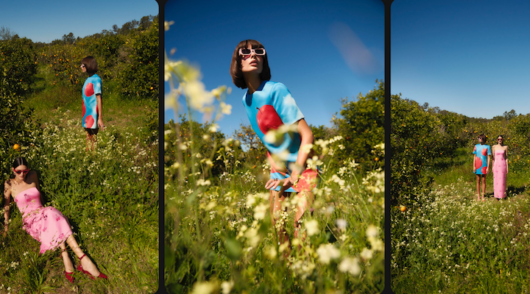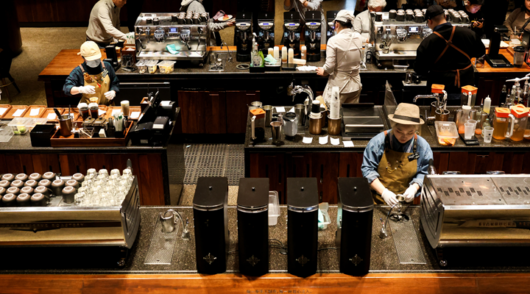In the world of high-end fashion resale, few names stand out as prominently as Vestiaire Collective – a marketplace that has revolutionized how consumers buy and sell pre-owned luxury items. At the helm of this groundbreaking venture is Fanny Moizant, the co-founder and president whose vision and leadership have propelled the company to become a global phenomenon. In an exclusive interview, Moizant opened up about her journey to pioneering one of the most successful online resale platforms
tforms.
From the early challenges of breaking into a highly competitive market to the strategies that have helped Vestiaire Collective thrive amidst a global pandemic, Moizant shares insights for aspiring entrepreneurs and industry leaders alike.
Inside Retail: Tell me about your career journey. How did you get into the industry, what are some of the different roles you’ve held along the way?
Fanny Moizant: My fashion career started with an internship at John Galliano, before I moved on to work as a marketing manager at lingerie company, Dim. Afterwards Mexx, and eventually I settled at Venilia, a French interior design company, where I worked for six years.
In particular at Galliano, I enjoyed the high energy and dedication of the team. You could immediately see that everyone loved what they were doing and I realized that this was the type of environment I wanted to work in, and which I also foster among our global team at Vestiaire Collective now.
My years of experience in the luxury fashion and interior design industries also taught me meticulous attention to detail, the importance of bringing both design and quality together, as well as top-notch customer service to gain trust and build something meaningful.
This knowledge combined with my expertise in marketing – as I earned a management degree at the Institut de la Mode in Paris – paved my way to found Vestiaire Collective in 2009. When I looked around me, I noticed a significant change in the way people – including my friends and myself – consume fashion: we bought more but wore less.
The extreme rise of social media and fast fashion has soon led from an era of possession to an era of usage, where consumers are in urgent need of a more sustainable solution to cope with this issue. This vision then led to the creation of Vestiaire Collective, with the aim of transforming the fashion industry to a more sustainable future.
IR: What are some of the challenges you’ve faced in your career and how have you dealt with them?
FM: One of the challenges that I’ve faced in my career was actually setting up the business itself, and having to start everything from scratch.
From developing all the processes, and imagining all different kinds of scenarios, to fine-tuning the authenticity process, packaging, logistics, technical aspects of the website, and more.
We had to work very hard to build the company and learn to run it to ensure growth and success.
I’m extremely grateful and proud of our team for being so hard-working and creative, because without them, Vestiaire Collective wouldn’t be the globally leading resale platform for pre-loved luxury fashion now, a B Corp-certified company with millions of members in 80 countries.
IR: What are some of your career highlights so far?
FM: With Vestiaire Collective’s aim being to raise awareness for the two major problems of the fashion industry – overproduction and overconsumption – actually taking the step of banning fast fashion brands from our platform last year was a huge milestone for us.
This is our way of saying ‘no’ to a system that supports harmful practices that cause enormous damage to the environment and societies we live in. We worked with an NGO – the OR Foundation – and arranged a trip to Ghana to see the state of the landfills and create ways to act on this problem.
Soon afterwards, we decided to start a petition by holding big polluters – mass-market producers – accountable through stronger and larger EPR regulations.
On the fashion side of things, our latest collaboration with ‘Old Céline’ collector and Philo-phile, La Fred Touch, is one of our latest highlights. La Fred Touch worked closely with our style team to curate an exclusive edit of over 300 Philo-era Céline pieces just in time for Paris Fashion Week last September.
Through this exceptional collaboration, we can now offer fashion enthusiasts and collectors from around the world the opportunity to acquire the rarest and most iconic, authenticated pieces from Philo’s tenure at Céline. I’ve always been a huge Céline and Phoebe Philo fan, so turning this idea into reality was one of the most recent highlights of my career.
IR: What do you love about your job?
FM: I love everything about my job – the business adrenaline, meeting the most interesting new people from fashion but also tech, retail and many other industries, being surrounded by a talented team from Paris to Hong Kong or Singapore, traveling, and the opportunity to constantly learn and being confronted to unknown terrain – these are just a few aspects why I love what I do.
IR: What advice would you give someone who wants to get into your line of work?
FM: There are several aspects to consider when starting an online business in the fashion industry. However, the most common mistake that I’ve seen so far, is that some people who would like to develop a business build their websites and put it live and think it’s done.
Just because they’ve put so much energy and money into building those elements — which are, in fact, necessary — they think the work is almost done and the business will start growing.
That’s actually completely wrong because once your product is online, who is going to find it organically? It is as if you need to start another completely new job, which is more about marketing, PR and strategic communications, in order to tell the world that you exist and that they have to come to you.
It’s essential to always build and further develop your brand, because building an online business is great, but people are relating to a brand. That’s also one of the strengths that makes Vestiaire Collective stand out amongst any competitors.
I hope that in another 10 years, we can still say we’ve built a brand that is consistent, appealing, that speaks to its audience, and has a decent reach and awareness across the globe.
A brand is what truly keeps the story alive through the years and trends.
Moreover, when you’re building a digital business, you need to have several competencies to really be able to succeed and grow.
You need to know your own strength and expertise, and then build your team: surround yourself with the best experts in all the other things you don’t know how to do. Once you have your team of very capable experts, executing all different aspects of the business, then you have a chance to be successful.
IR: What’s your approach to work-life balance?
FM: Maintaining a work-life balance is difficult. I try to give all I can to my family, but sometimes it’s not enough. However, I would say the most important thing is not the quantity, but the quality of time you can give. I had to learn how to switch off my phone or laptop for a while to embrace the time with my children or husband.
IR: Where do you go for career advice?
FM: The best career advice I’ve received was from an entrepreneurial course at fashion school. During that course, the teacher told us ‘You all want to do something and launch a new business, but the first step is to actually want to find an idea.’
For this, he told us to ‘bring a notebook everywhere you go, and on a daily basis, you’ll face some dissatisfaction. It could be tiny things, such as your coffee is not hot enough, or perhaps it was delivered too late. Make the habit of writing these things down and come back to it regularly, then you’ll see that someday, amongst your daily dissatisfaction, they might convey an idea for a business.’
If you feel a certain, daily dissatisfaction, then there’s a high possibility that a hundred people around you feel the same. And if you manage to fix that problem, then that’s a business. It’s about finding a solution for a need that has not been not been catered to yet.
That was very good advice which also helped me come up with the idea of Vestiaire Collective.
IR: Do you have any hobbies that help you switch off and stay balanced?
FM: For me, exercise really helps me to switch off and stay balanced. When I was still living in Hong Kong, I used to start the day by going to a 45-minute high-intensity class with loud, energetic music – I’d always come out with a completely clear mind.
IR: What does a typical day look like for you?
FM: Every day has a different kind of agenda. However, you can often find me in our HQ in Paris working closely with the different teams to ideate omnichannel marketing initiatives and make sure that our brand strategy is well-rounded on a global scale. I’m also working closely with our sustainability team to continuously build and elevate our sustainability pillar.
IR: Do you have any “work hacks” for getting things done?
FM: One of my best work hacks is to keep a clear desk because trying to not work in a mess makes a huge difference. Also, it’s essential to always deal with the most urgent tasks first – prioritize. If I really need to concentrate, I pause all notifications on my phone, as they’re so tempting and once you check them, you lose focus and get distracted.
IR: What are some of the key leadership lessons you’ve picked up over the course of your career?
FM: One of the key leadership lessons I’ve learnt over the years, is that success takes extreme discipline and perseverance, hard work and determination.
Especially if you’re holding a leadership position, it’s up to you to inspire and motivate your team – this is the key to success.
Also, use your time effectively whilst staying focused on your objective. Set clear goals for your team, plan a routine that leads to this target, and follow this path until the end.







